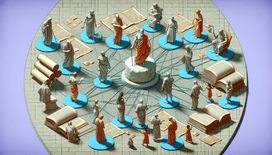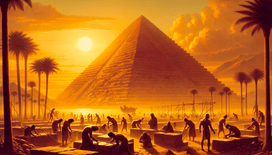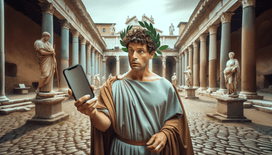Ah, the Exodus! A tale as old as time itself, or as I like to call it, the original 'epic road trip'. Our protagonist, Moses, finds himself thrust into the unenviable role of liberator, leading the Israelites out of Egypt. Of course, no journey is without its challenges, and there’s nothing like a good language barrier to spice things up. Enter: Google Translate. But what if Moses had this nifty piece of tech up his proverbial toga sleeve during his famous odyssey?
The Babel of Biblical Proportions
Imagine, the hustle and bustle of the ancient Egyptian market, echoing with the myriad tongues of the time. Now picture Moses, standing there with Google Translate in hand. He could have seamlessly navigated his way through those bustling bazaars, quipping clever phrases in Egyptian, Hittite, and even the odd Assyrian dialect, much like a Biblical James Bond.
But let’s fast forward to the main event: the plagues. You’ve got frogs, locusts, boils, truly a popup of biblical bugs. Communicating these divine deliverables to Pharaoh might have been an altogether different scenario if Moses could simply text Pharaoh with a ‘Dear Ramses, today’s plague is...’ translated in flawless Egyptian. Did I mention there’s a setting for hieroglyphs? Just imagine the emojis for that!
The Ten Commandments Reimagined
On a solemn mountain, shrouded in smoky clouds of divine drama, Moses receives the Ten Commandments. But what if our intrepid leader had Google Translate on speed dial? Instead of chiselling away laboriously, why not dictate them directly to a virtual assistant? “Google, translate ‘Thou shalt not covet thy neighbour’s ox’ into Hittite, lackeyspeak, and Phoenician imported stone tablet-approved font.”
Because really, if you’re going to carve laws that shape civilizations, you might as well make sure everyone can read them, n’est-ce pas?
Lost in Translation or ‘Locusts on the Loose’?
Of course, we must not forget the language mishaps potentially avoided. One mistranslated command could spark itself a new religion or a misunderstanding greater than the question of why bunnies have such poor chocolate laying skills at Easter. Thanks to auto-correct, maybe those frogs really meant to stay in the Nile.
But this brings an amusing reflection: imagine the Israelites, abruptly stopping mid-crossing of the Red Sea (dodging the odd digital wave) only to argue over a miscommunication involving sandaled feet and salty escapades. Aquatic adventures, indeed!
The Road Less Travelled? Try Smoother with Directions!
As they say, all roads lead to… well, the Promised Land? Yet Moses and his merry band of Israelites found themselves wandering for 40 years. Throw Google Maps into the scenario, and you might have Moses audibly sighing with relief, “Re-routing to promised destination in 40 years minus a detour through the Sinai Peninsula.” Ah, the miracles of modern tech.
Mind you, Siri might have been near tears recalculating the path with that kind of divine intervention. “Please move the burning bush.
Farewell to the Barrier
In an alternate universe, where Moses strolls through the desert with 5G coverage and data light as manna, Google Translate might just have redefined biblical journeys. It’s interesting to ponder, isn’t it? Technology meeting faith like a cosmic matchmaker at the Red Sea’s edge.
So next time you find yourself lost, pondering directions or grappling with an unfamiliar language, take a moment. Consider what Moses might have given for a virtual assistant capable of distilling divine commandments with the clarity of a smartphone screen. Now that's a blessing!







